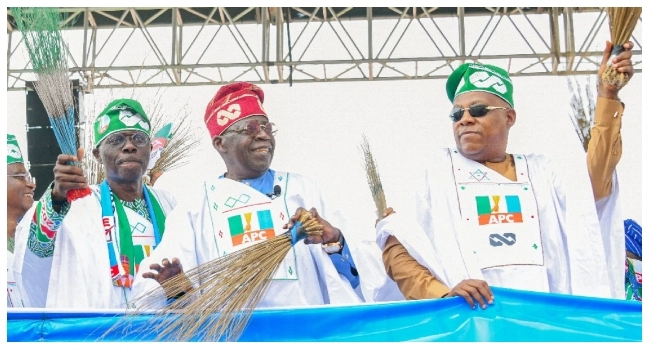The presidential candidate of the All Progressives Congress (APC), Bola Tinubu is banking on his alliance with some outgoing northern governors to get votes in the region.
At the Teslim Balogun Stadium in Lagos State on Saturday during a rally, Tinubu boasted that his alliance with the governors of Kano, Katsina, Kaduna, Kebbi, Kwara, and Plateau will deliver for him the bulk of the votes he needs to outsmart his main opponents including Atiku Abubakar of the Peoples Democratic Party (PDP), Peter Obi of the Labour Party (LP), and Rabiu Kwankwaso of the New Nigeria People’s Party (NNPP).
Tinubu’s statement comes five months after about 10 northern governors backed his candidacy at a keenly contested primary in June.
“Can you see the governors of Kano, Katsina, Kaduna, Kebbi, Kwara, and Plateau?” Tinubu asked a crowd of APC supporters decked up in party paraphernalia on Saturday.
“We won’t lose any of the states. We will govern this country together. They are here in Lagos to show their support for me,” he added in Yoruba.
The governor of Lagos from 1999 to 2007 also urged the party’s supporters to get their Permanent Voters Cards (PVCs) and vote for him at the February polls.
In attendance at the rally include APC National Chairman, Abdullahi Adamu; Speaker of the House of Representatives, Femi Gbajabiamila; Minister of Works and Housing, Babatunde Fashola; Lagos State Governor Babajide Sanwo-Olu and his deputy, Obafemi Hamzat; amongst other APC stalwarts.
Historically, since Nigeria’s return to democracy in 1999, the northern region of the country had the highest voter turnout at presidential elections and the top contenders for Aso Rock’s top job in 2023 have since pitched their tents to win over most of the 19 states in the region.
For instance, Kano had over 1.8 million cumulative votes – the highest by any state in the 2019 presidential election. The state has witnessed some of the highest defections amongst PDP, NNPP and APC of late. Kano is home to Governor Abdullahi Ganduje, a Tinubu ally; Ibrahim Shekarau, an Atiku supporter; as well as Kwankwaso, who relies on his base and socio-political movement, Kwankwasiyya to get votes in the north.
Also during the 2019 presidential election, Kastina and Kaduna polled 1.5 million separate votes, Plateau with over 1 million votes, Kebbi with a total of 650,000 votes, and Kwara with a paltry over 400,000 total votes – all mainly shared between the APC’s Muhammadu Buhari and PDP’s Atiku Abubakar. Other states with heavy numerical voter strength based on past elections include Jigawa, and Bauchi, amongst others.
At the last election, Kastina-born Buhari won 19 states, many of which were northern APC states while Adamawa-born Atiku won 18 states – with a total of 15 million to 11 million votes respectively.
According to Section 34 of the Independent National Electoral Commission’s (INEC) Regulations and Guidelines for the conduct of elections, a presidential candidate can only be announced as the winner if he or she “has the majority of votes cast at the election; and has not less than one-quarter of the votes cast at the election in at least two-thirds of all the States in the Federation and the Federal Capital Territory, Abuja.” This means that a candidate must get 25% of votes in 24 states across the Federation to win a presidential election.
At the moment, APC controls 21 states with the exclusion of Osun which will become a PDP state on Sunday, November 27, 2022, when Ademola Adeleke is sworn in. Similarly, PDP controls 13 states as of press time while the All Progressives Grand Alliance (APGA) controls Anambra State.
However, Tinubu is confronted with a major hurdle due to his choice of Kashim Shettima, a former governor of Borno State, and fellow Muslim as running mate, a development that has been rejected by Christian groups and leaders.
Also, there are fears that the intra-party squabbles between the G5 led by Governor Nyesom Wike of Rivers State and Atiku over the chairmanship of Iyorchia Ayu would affect the chances of the PDP presidential candidate at the polls next February. A former national chairman of the APC, Adams Oshiomhole recently said the neutrality of the G5 is good for Tinubu’s chances.
On the other hand, Tinubu faces a new challenger in the game – Obi – a new bride and darling of many Nigerian youths who are tired of the two dominant parties – the PDP and the APC.
Obi and his running mate, Datti Baba-Ahmed, have vowed to push out the APC from Aso Rock. “Whoever thinks that Labour Party or Obi-dient movement or Peter Obi as an individual is not being welcomed in the north, they are making a huge mistake,” Baba-Ahmed had said.
Although at least three polls have put Obi ahead of other candidates, only time will unveil the winner of the February 25, 2023, presidential election.

